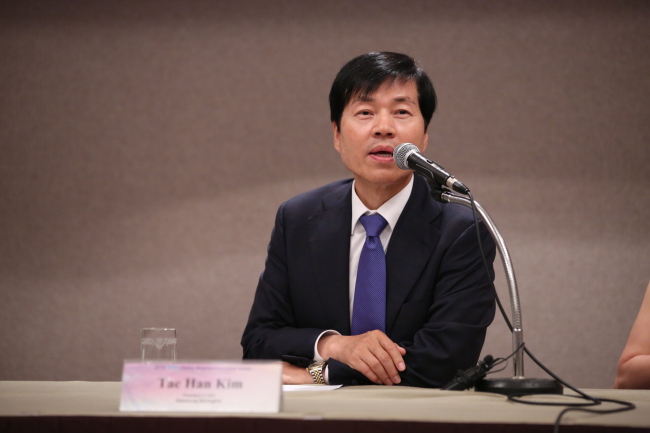More than half of the 100 most used medicines worldwide will be biologics by 2018, experts said on Wednesday, stressing the need for developing the local biopharmaceutical industry.
“As the world market for biomedicine is getting bigger, we think it will create a lot of future opportunities for local companies,” said Jang Byung-won, vice minister of the Food and Drug Safety Ministry, during the Global Biopharmaceutical Forum in Seoul.
“Medical biology is the key business that will directly affect our health and provide solutions for diseases in our future.”
 |
Kim Tae-han, president and CEO of Samsung Biologics, speaks during a press conference in Seoul on Tuesday. (Ministry of Food and Drug Safety) |
Jang said his agency estimates the global biopharmaceutical market will grow to $260 billion by 2020, up from $144.2 billion in 2010.
Meanwhile, the Korean pharmaceutical market was only valued at 19 trillion won ($18.7 billion) back in 2012, while the biopharmaceutical market was valued at 2 trillion won. But the biopharmaceutical market has been growing by an average annual rate of 23 percent, Jang said.
A biopharmaceutical, simply known as a biologic, is any medical product extracted from or manufactured with biological sources. Examples of biologics include gene therapy, allergenics, vaccines or blood components.
Kim Tae-han, the president and CEO of Samsung Biologics, said the local biopharmaceutical industry needs more time to develop.
Samsung Group last year invested 600 billion won in its biopharmaceutical affiliate, in an effort to find a new growth engine alongside its mobile electronics businesses.
“It takes 14 or 15 years to develop a new biologic, and the Korean biopharmaceutical industry has been around for less than 15 years,” the CEO said when asked why the local industry focuses on developing biosimilars, the legally approved subsequent versions of biopharmaceutical products made by a different company, rather than trying to develop a biologic of its own. Samsung Biologics was launched in 2011.
“Developing biosimilars allows us to learn about the field and gives us a foundation to create new, original biologics eventually. We need the experience. I don’t think it’s necessarily the right way to focus on developing new biologics right away.
“And this business requires collaboration, as making a biologic is an incredibly complex process,” he continued.
“Think of it as making a car. You’d need an engineer, a designer, a manufacturer and etc. Automakers work with a company that only produces a particular car component for years. And it took the local automobile industry some 40 years (to be influential overseas).”
By Claire Lee (
dyc@heraldcorp.com)








